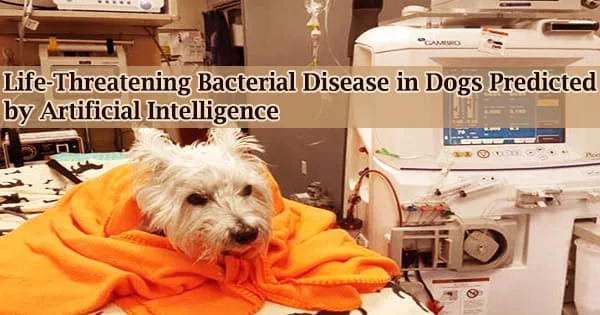Leptospirosis, a condition that can affect dogs who drink water tainted with the Leptospira bacteria, can result in liver illness, severe bleeding into the lungs, and kidney failure. The importance of early disease identification cannot be overstated as it may mean the difference between life and death.
A method to forecast canine leptospirosis using artificial intelligence has been found by veterinarians and researchers at the University of California, Davis, School of Veterinary Medicine.
After months of testing numerous models, the researchers came up with one that performed better than conventional testing procedures and offered precise disease early detection. Journal of Veterinary Diagnostic Investigation revealed the ground-breaking finding.
Dogs, especially those who spend a lot of time outside, are prone to a variety of bacterial and fungal illnesses. Because some bacterial infections can be lethal if treatment is delayed, pet owners may worry about these infections.
In the body of our dogs, bacteria play a critical role. They generate comparable healthy flora on the skin as they do in the intestine, where they provide a balanced digesting intestinal flora.
Sadly, not all microorganisms are helpful and harmless. For example, leptospirosis, a so-called zoonosis that may spread from animals to people and vice versa, can be exceedingly deadly for both our pets and us humans.
“Traditional testing for Leptospira lacks sensitivity early in the disease process,” said lead author Krystle Reagan, a board-certified internal medicine specialist and assistant professor focusing on infectious diseases.
“Detection also can take more than two weeks because of the need to demonstrate a rise in the level of antibodies in a blood sample. Our AI model eliminates those two roadblocks to a swift and accurate diagnosis.”
The study used historical information on individuals who had been tested for leptospirosis at the UC Davis Veterinary Medical Teaching Hospital. These 413 canines’ routinely drawn blood was utilized to train an AI prediction algorithm. 53 other dogs with possible leptospirosis were treated at the hospital throughout the course of the following year.
Traditional testing for Leptospira lacks sensitivity early in the disease process. Detection also can take more than two weeks because of the need to demonstrate a rise in the level of antibodies in a blood sample. Our AI model eliminates those two roadblocks to a swift and accurate diagnosis.
Krystle Reagan
All nine canines that tested positive for leptospirosis were accurately diagnosed by the model (100 percent sensitivity). The 44 canines who finally tested negative for leptospirosis were likewise properly recognized by the model in almost 90% of cases.
The model’s objective is to develop into an online tool where veterinarians may enter patient information and quickly receive a forecast.
“AI-based, clinical decision-making is going to be the future for many aspects of veterinary medicine,” said School of Veterinary Medicine Dean Mark Stetter.
“I am thrilled to see UC Davis veterinarians and scientists leading that charge. We are committed to putting resources behind AI ventures and look forward to partnering with researchers, philanthropists, and industry to advance this science.”
The detection model may help people
Leptospirosis is a zoonotic illness that can spread from animals to people and is potentially fatal. Reagan thinks that the technology underlying this ground-breaking detection model will be able to be applied to human medicine because the condition is also challenging to diagnose in people.
“My hope is this technology will be able to recognize cases of leptospirosis in near real-time, giving clinicians and owners important information about the disease process and prognosis,” said Reagan. “As we move forward, we hope to apply AI methods to improve our ability to quickly diagnose other types of infections.”
The school’s Artificial Intelligence in Veterinary Medicine Interest Group, which consists of veterinarians advocating the application of AI in the field, was founded by Reagan. The Center for Data Science and Artificial Intelligence Research at UC Davis, directed by mathematics professor Thomas Strohmer, was involved in this research project. He worked on creating the algorithm with his classmates.
Reagan’s team is actively investigating AI for various sorts of diseases, such as a prediction model for infections caused by antimicrobial resistance, which is a significant issue in both veterinary and human medicine.
The team previously created an AI model with a greater than 99 percent accuracy rate for predicting Addison’s disease. The National Science Foundation provides financial assistance.
















